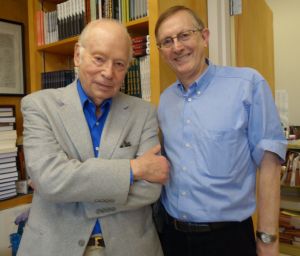Steven Weinberg – theorist’s theorist
Steven Weinberg has been one of the most luminous stars of theoretical physicist for fifty years. For over half that time, he has been based at the University of Texas at Austin, where Graham talked with him at length this week about the relationship between pure mathematics and fundamental physics, the subject of Graham’s next book.
Weinberg, now 81, was on fine form, talking energetically about physics – past, present and future – and about his many other interests, including theatre, books and history. He has read and enjoyed Graham’s latest book, Churchill’s Bomb, where he learnt that he and the great war leader share their two main literary influences, Macaulay and Gibbon.
Over the past two decades, Weinberg has written several outstanding text books on quantum mechanics, quantum field theory and cosmology, as well as collections of essays. His next book To Explain The Universe, to be published in 2015, is about the early developments of science, from its beginnings with the Ancient Greeks to the work of Isaac Newton.
For most of the conversation, Weinberg was talking about modern theoretical physics. He has championed two radical shifts in our thinking about the universe – the idea that physicists must pursue unified theories of all the interactions of the fundamental particles, and the use of these theories to describe the origins of the universe in the Big Bang. Weinberg wrote about these ideas in his seminal popular book The First Three Minutes (1977).
Weinberg is first and foremost a physicist, respectful of mathematics but not seduced by its power and beauty. Concerned by the lack of strong new clues about how to develop the Standard Model of weak, electromagnetic and strong interactions, He believes that particle physics would now ‘benefit from a kick up the pants from experiment’. Perhaps this will happen when the Large Hadron Collider starts up again next year?
Graham left Austin uplifted by Weinberg’s insights, optimism and zest for life.
